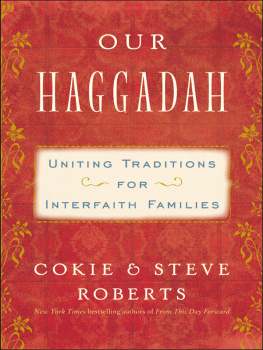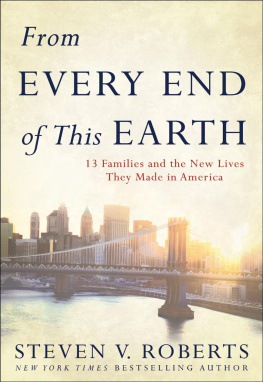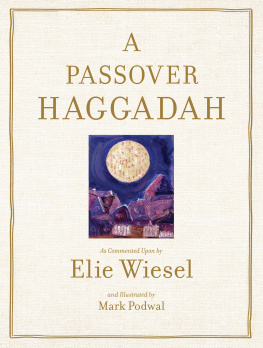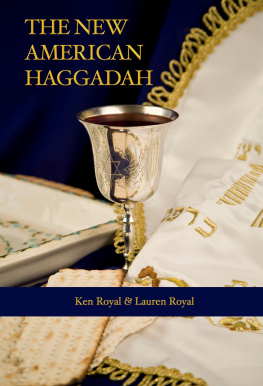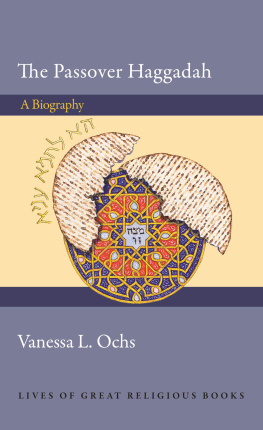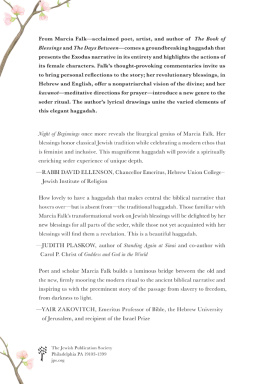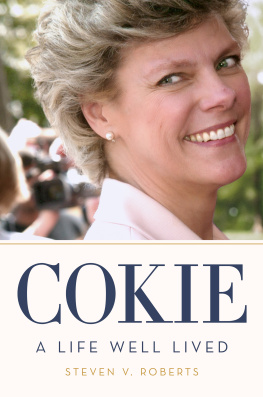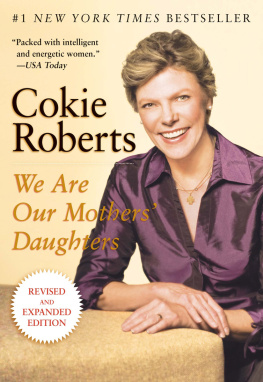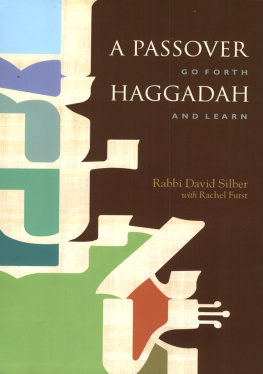Did Elijah Come to Your House?
BY STEVE ROBERTS
D ont worry. We didnt have a Seder when I was growing up, either.
Yes, I was Jewish, quite Jewish, really. But for my family, Judaism was more a cultural concept than a religious one. Ive run Seders for more than forty years now, yet I have no traditions or memories to draw on. My parents never taught me how to celebrate Passover because they didnt know. My grandparents didnt know, either. I taught myself (although my Catholic wife feels her constant kibitzing was an invaluable part of my education). If I can do it, you can, too.
Back in Europe, we were Jewish, because history defined us as Jews and our neighbors treated us as Jews. That is, badly. My grandparents were all born between 1881 and 1892 in the Pale of Settlement, a vast area on the western edge of the Russian empire where Jews were allowed to live. But anti-Semitism was still deeply rooted in the local culture. My mothers father, Harry Schanbam, was a stringently secular man who would walk through the streets of his hometown of Grodno (now in western Belarus) on Saturday, the Jewish Sabbath, smoking cigarettes to show his disdain for religious rituals. Like many Jews of his time and place, politics became his religion, and as a flaming socialist (my uncles description) he earned the enmity of the local Cossacks, a paramilitary force with a fondness for beating up Jews. As he used to tell me, he finally left for America after the Cossacks rode through his mothers house for the third time looking for him. My fathers father, Avram Rogowsky, grew up in Bialystok (now in eastern Poland), where a vicious pogrom killed dozens of Jews in 1906. He, too, was a political radical, but his real religion was Zionism, and a year later he fled to Palestine and worked on some of the first roads built in Tel Aviv. The dream did not last and Abe, as he came to be known in America, eventually settled in Bayonne, the town in northern New Jersey where I was born in 1943.
I knew my grandparents very wellHarry lived with us (my grandmother Sadie died before I was born), and Abe and Grandma Miriam were three blocks away. Neither grandfather had a bar mitzvah. I recall no religious symbols in their homes, no holidays, no devotions. My father and my uncles never had bar mitzvahs, and when my parents got married they followed that same secular tradition. Left-wing politics was their passion, not organized religion, and my father was at times uneasy with his ethnic background. On my birth certificate Im Steven Rogow (the sky was long gone), but Dad changed it to Roberts when I was two. More American, less obviously Jewish. Growing up, I was oblivious to my sanitized name (its Welsh, actuallylovely people, but not my people). I knew I was Jewish. Most of my neighbors and classmates were Jewish, after all. So were the local shopkeepers and my parents friends. We ate pastrami from Botwinicks deli, gefilte fish from Levines market, and cheesecake from Mortmans bakery. I joined the Cub Scouts and played basketball at the Jewish Community Center. My grandfathers read Yiddish newspapers. But from Seders we knew bupkis (a colorful Yiddish expression meaning absolutely nothing).
At about age twelve, I became interested in organized Judaism. My twin brother, Marc, and I actually asked our parents if we could have bar mitzvahs. Im sure the main reason was peer pressure. All the other Jewish boys were having them, and we werent. The presents were pretty great, too. But perhaps I was also looking for some deeper form of identity. Unlike my ancestors, I didnt feel Jewish because of history or oppression. The Cossacks (or the Nazis) were not a big threat in New Jersey. But reconnecting with organized Judaism was tricky. In Bayonne, most Jews attended the large Conservative congregation or several small shuls (Orthodox synagogues), and my parents would have felt wildly uncomfortable in any of them. A group of young professionals had recently organized a Reform temple in town, however, and that was a better fit. So my folks reluctantly joined up and enrolled us in Hebrew school. The common story is that immigrant families stray from their Old World traditions as they become more American. In a sense I was reversing that pattern, reconnecting to my Jewish roots, to the name Rogow, which was on my birth certificate, rather than the homogenized version my father had chosen.
After my bar mitzvah I stayed active in a statewide group called JFTY, the Jersey Federation of Temple Youth (I have a tattered old JFTY sweatshirt framed on my wall as I write this, thanks to my aforementioned Catholic wife). Yes, I liked meeting new girls from other towns (I took Myrna Goldblatt to my senior prom), but I also enjoyed the intelligent talk about religious questions that threaded through our weekend meetings. It was my first hint of college life, of late-night bull sessions with smart people who made you think about basic issues. (One of my pals, Peter Knobel, became a rabbi, and another, Alan Kors, a history professor.) Once I got to Harvard, most of my roommates were Jewish, as were my friends at the Crimson , the student newspaper, but the connections we shared were more tribal than religious. When one of my roommates got married after graduation and asked Harvards rabbi to perform the ceremony, it was an embarrassing moment. None of us had ever met the guy.
But by then my view of religion was starting to change. I had met a girl named Cokie Boggs, a student at Wellesley, and she was an observant Roman Catholic. Cokie had attended religious schools all her life and stayed in touch with the nuns who taught her. She went to Mass regularly and one of our first dates, during spring vacation of junior year, took place in New York. We went to a movie and then stayed up all night talking. As dawn broke she went off to church, and I caught a bus back to Bayonne. My grandfather Harry was already up when I arrived home and he gave me a stern, silent look. Pop, I thought, if you only knewIve been with a Catholic girl whos now praying in church.
Our relationship matured slowly. I was a typical guy, petrified of commitment of any sort. More seriously, the religious issue was never far from our minds. My parents were adamantly against the match and I had always been a good son: loyal, loving, headed for a life in journalism, which they encouraged and admired. Defying them was the hardest thing Ive ever done. So that meant many long talks with Cokie, many tears, many times we thought this relationship could never work. But gradually an understanding started to develop, a possible future began to take shape. We realized, eventually, that the values uniting us were far stronger than the theology dividing us. When we talked about how we wanted to live our lives, day by day, year by yearas a couple, as parents, even as grandparentswe found a common ground, a high ground, where we could build a family together. I knew it would work out when my father said to me at one point, It would be a lot easier to oppose this marriage if it wasnt so obvious shes the perfect girl for you.
Having an understanding and working it out in practice are two different things. Mixed religious couples can essentially choose one of three paths: they can practice no religion, pick one or the other, or do both. Different patterns work for different partners; theres no one-size-fits-all answer, but we really had only one choice. Cokie was far too observant to consider the first option. I was not nearly as devout as she was, but I was more a Rogow than a Roberts, I was on a journey that had started with my bar mitzvah years before. I could not give up my religion, and Cokie didnt want me to. In fact, part of the attraction between us was a shared devotion to our traditions, families, histories. In that sense we were both Old World and old-fashioned. So we agreed. Wed do both. Wed practice both faiths and our wedding became a test case. Instead of a church, we got married in the garden of Cokies home (where weve now lived for more than thirty-three years). We couldnt find a rabbi to join Cokies uncle, a Jesuit priest, in performing the actual ceremony. So we asked Arthur Goldberg, a close friend of Cokies parents, to give a talk on Jewish teachings about marriage. We had a chuppah, a Jewish wedding canopy, and I broke a glass, the traditional close of any Jewish ceremony. My parents and their friends felt embraced and respected. It was a good start, but only a start.

